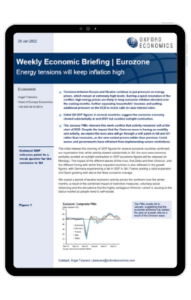Research Briefing
| Jan 28, 2022
Energy tensions in the eurozone will keep inflation high

Tensions between Russia and Ukraine continue to put pressure on energy
prices, which remain at extremely high levels. Barring a quick resolution of the conflict, high energy prices are likely to keep eurozone inflation elevated over the coming months, further squeezing households’ incomes and putting
additional pressure on the ECB to resist calls to raise interest rates.
What you will learn:
- Initial Q4 GDP figures in several countries suggest the eurozone economy slowed substantially at end-2021 but avoided outright contraction.
- The January PMIs released this week confirm that activity remained soft at the start of 2022.
- Despite the impact that the Omicron wave is having on mobility and activity, we expect the euro area will go through a soft patch in Q4 and Q1 rather than recession, as the new variant proves milder than previous Covid waves and governments have refrained from implementing severe restrictions.
Tags:
Related research

Post
US Key Themes 2026: Exceptionalism amid fragmentation
US exceptionalism is alive and well, and that won't change in 2026.
Find Out More
Post
Global Key themes 2026: Bullish on US despite AI bubble fears
We anticipate another year of broadly steady and unexceptional global GDP growth, but with some more interesting stories running below the surface.
Find Out More[autopilot_shortcode]
